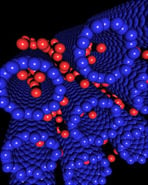Hydrogen Storage
The DOE Hydrogen Program activities for hydrogen storage are focused on advanced storage of hydrogen (or its precursors) on vehicles or within the distribution system.
Hydrogen storage is a key technological barrier to the development and widespread use of fuel cell power technologies in transportation, stationary, and portable applications. DOE's efforts focus primarily on the early-stage research and development (R&D) of on-board vehicular hydrogen storage systems that will allow for a driving range of greater than 300 miles while meeting packaging, cost, safety, and performance requirements to be competitive with current vehicles. While hydrogen fuel cell electric vehicles traveling more than 300 miles on a single fill are now commercially available in selected regions in the United States, this driving range must be achievable across different vehicle models and without compromising space, performance, or cost.
Hydrogen storage systems for non-automotive applications such as portable power and material handling equipment and for refueling infrastructure such as hydrogen carriers are also being investigated. When appropriate, these investigations are coordinated with other federal agencies such as the Department of Defense and with other program activities such as hydrogen delivery.
High-Pressure and Cryogenic Tanks
The Office of Energy Efficiency and Renewable Energy is developing and evaluating advanced concepts to store hydrogen at high pressures and cryogenic temperatures that improve volumetric capacity, conformability, and cost of storage.
Advanced Solid State and Liquid Materials
The Office of Energy Efficiency and Renewable Energy and the Office of Fossil Energy are working to develop innovative materials for reversible hydrogen storage including high surface area adsorbents, metal organic frameworks, and metal hydrides, as well as approaches that are regenerable off-board such as chemical hydrides and liquid carriers.
Basic Research
The Office of Science's Office of Basic Energy Sciences focuses on the basic research needs in developing novel storage materials and methods. The broad class of storage materials to be studied includes various forms of complex hydrides and nanostructured materials.

Compact, lightweight carbon adsorbent materials, like carbon nanotubes, can store significant amounts of hydrogen at room temperature and are being investigated for possible use in a hydrogen storage system.
